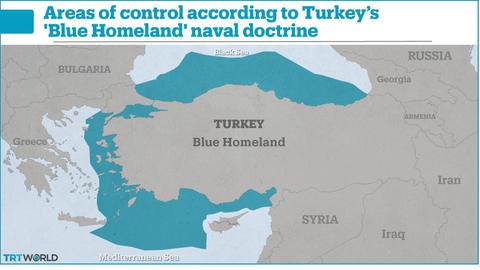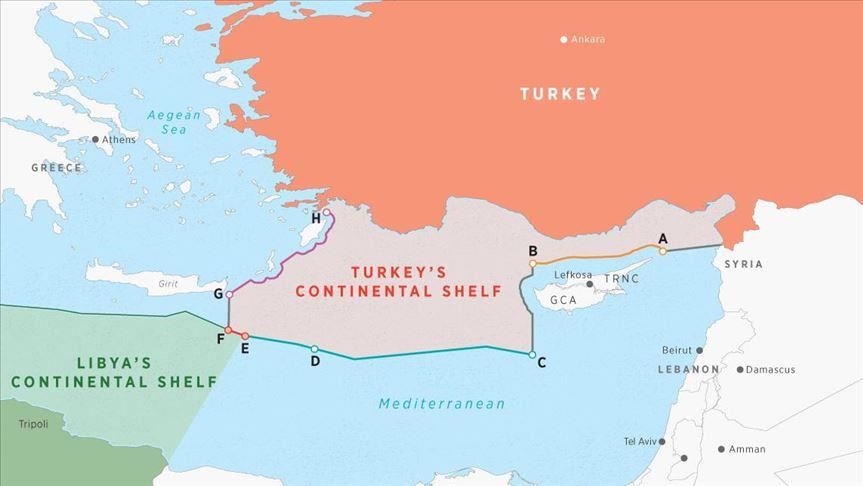From “Blue Homeland” to Reuniting the Ottoman Empire?
A Clear No from the Greeks, the Armenians, the Israelis and the Syrians

All Global Research articles can be read in 27 languages by activating the “Translate Website” drop down menu on the top banner of our home page (Desktop version).
***
“Mavi vatan,” or “blue homeland,” has become a common phrase in Turkish political life. It is most often used as a shorthand expression for Ankara’s maritime claims in the eastern Mediterranean. Central to these interests is the presence of large deposits of natural gas off the coast of the island of Cyprus.” R. Gingeras
See map below
***
The interests of states are permanent and alliances are by definition changeable, and when one country calls on another to resume talks, as Turkey did through its Foreign Minister Mevlut Cavusoglu to Greece, the one in power will impose conditions. Why am I emphasizing this? Turkey has already issued a NAVTEX until the end of 2021 and in the heart of the Aegean. After the call, we also had overflights of Turkish warplanes over Eastern Aegean islands.
Greece agrees to discuss only the demarcation of maritime zones, while Turkey, which has grayed the Aegean by disputing up to 150 tiny islands, wants to discuss the demilitarization of islands, a national airspace of 10 nautical miles (nmi), and other issues. Is Turkey preparing for another show of strength, having in its pocket after January 25, a new blame game against Athens?
And in a way, they will want to throw ashes in the eyes of the US (with a new leadership in the State Department) and the EU, saying that if the talks that are most likely to fail and “it is the fault of Athens, which is rearming like lobster.” We have to look between the words of what Turkey and President Recep Tayyip Erdogan achieved in recent years. And clearly, it does not matter if his mansion has 300 rooms or if he teaches democracy lessons to the Americans after the events of January 6. It concerns us if Turkey has launched a kind of hybrid attack against the country that is celebrating 200 years since 1821.
And it concerns the Greek people that in the years from 2002 to 2016 in the exploratory that were conducted (this was highlighted by recent SLpress articles), they did not discuss the delimitation of the continental shelf and the Exclusive Economic Zone, the outstanding issue, but various issues that arose by Turkey and for the coastal zone of the country, the 12 nmi, which it should be only a domestic issue of Greece based on international law. And if you talk to Turkey about something that is your right, then do you not cease to be a sovereign state?
On the other hand, in recent years from an economic point of view, Turkey is following in the footsteps of Argentina. Mr Erdogan has worked wonders and is carefully planning for the future, strengthening the defense industry and preparing to celebrate the 100th anniversary of the founding of the Turkish Republic in 2023 (perhaps by stealing some glory from Mustafa Kemal Ataturk). He gives interviews on TV talking about the “Blue Homeland” doctrine and blaming all their misfortunes on their Greek neighbors.
Source: Dimitris Eleas
Foreign policy in vertigo
Turkey is pursuing a foreign policy as if it were dizzy. It behaves in neighboring countries as if they were still provinces of the Ottoman Empire. Turkey has a rivalry with Israel, attacked Syria, is militarily involved in Libya, built a military base in Somalia, and expands into the Caucasus via Azerbaijan in order to harm Armenia.
In Greece and Cyprus it exercises unprecedented psychological violence and madly violates their rights at sea and air. It faces the Eastern Mediterranean like a private lake in a zoo. But what is Erdogan’s Turkey really seeking? How is he doing so far? “Strategically, modern Greece is a dwarf” pointed out Professor Panagiotis Hephaestus. “Dwarf” because the Ionian is “the wrong sea” to expand your territorial waters.
The Turks also ostentatiously underestimate the statements of the American ambassador in Athens, Geoffrey Pyatt, which are clear regarding the inhabited islands, “which have equal rights with the mainland”, always based on international law. And perhaps, let it be said, that it is not only psychological violence and constant bullying, but the Greeks are directly threatened by Turkey with military action – a NATO “ally” country – and this is something they probably do not want.
With incredible logic
For decades, Turkish diplomacy has repeatedly shown that it blatantly violates the rights of Greece. It does not want to hear about its maritime zones in the Aegean, which is the de facto exercise of its sovereign rights (it wants to limit Greece to 6 nmi). Turkey signed an agreement with the Muslim Brotherhood Government of National Accords in Libya (November 28, 2019) for “fantastic sea borders”, without taking into account Crete, Karpathos, Rhodes, and small Greek islands like Kastellorizo.
Why fantastic? If one reads the map carefully one will immediately notice the absurdity.
With incredible logic, it is as if we are excluding maritime zones in Hawaii and the United Kingdom as an example. Turkey also does not respect the maritime zones that Cyprus has. As for Cyprus’ maritime zone, Turkey generously wants to “offer it” to Israel, in a “Libyan type” agreement.
In addition, Turkey does not like the construction of the EastMed pipeline (a pipeline that will be built by Israel, Cyprus and Greece and will transport natural gas to Europe via Italy). In addition, there’s the electricity interconnection from Crete to Israel through Cyprus. And in the air, Turkish warplanes not only violate Greek airspace, but thresh in the Aegean. With so many violations, the Turks seek to create a gray area regime, with sovereignty at odds, as they almost did after the Imia crisis of 1996. Why do the Turks humiliate their neighbors? What have they really orchestrated for decades now?
Expensive path
The scenario for a war like a ghost hovers over the Aegean and the Eastern Mediterranean (and is “postponed” for later by the Athenian elite). The Greeks are a historical nation, they cannot, almost always expect someone else to do something on their behalf. It should also cease to be taboo that Greece needs to move, one day, to the “expensive path” of nuclear technology as an additional means of deterrence – Israel did, Turkey tries it through Pakistan.
Greece is dragging itself to the negotiating table, and at least it should have demanded that Turkey renounce the idea of a “Blue Homeland” and the casus belli as conditions for attending. The “Blue Homeland” threatens Greece, “showing” the borders that Turkey will want to impose, in a reversal of the geopolitical status quo. And how will Greece prevent the Aegean from splitting into the 25th Meridian?
The multiplier of power for Greece is to be happy and to have the best possible military leadership, at the “zero moment”, that is, when Turkey will start the attack. It is not at all unlikely that this will happen before Mr Erdogan leaves the limelight. With an attack on Greece before 2023, he may want this to be his own legacy in world history, like another Mussolini, but from the east this time. Through military force Greece can repel the nightmarish scenario. And a nightmarish scenario for Greece will be bad for Armenia too, for Israel too, for Cyprus, for Syria and for all.
*
Note to readers: please click the share buttons above or below. Forward this article to your email lists. Crosspost on your blog site, internet forums. etc.
Dimitris Eleas is a New York City-based writer, independent researcher and political activist. His writings in the Greek language have appeared in books, journals and newspapers. You can contact him via his e-mail: [email protected]



